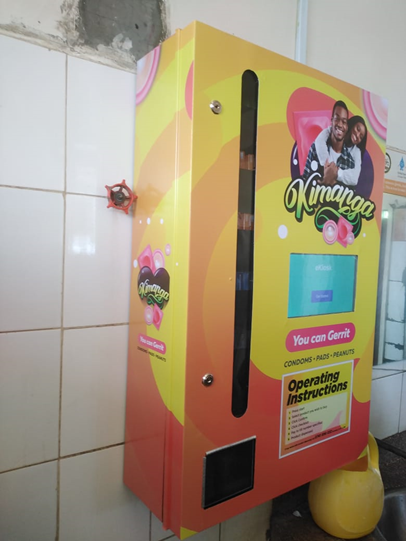This piece was originally featured on the Medium blog.
By Wycliffe Waweru, Deputy Director, Monitoring, Population Services International
Swap out the soda. Make way for the condoms.
In Kenya, we are testing creative ways to reach young people aged 20–29 with contraceptive products with existing platforms — and vending machines — they know and trust. In Nairobi, the Kenyan capital, we deployed “smart contraceptive vending machines” designed and adapted alongside the young consumers the solution serves. While condom vending machines have been around for quite some time, smart vending machines utilize the internet-of-things, enabling them to connect to the internet and unlock convenient features they would not otherwise be able to access. This internet connectivity enables the payment by mobile-money and allows the user to purchase products by either navigating on the machine touch screen or from their mobile phone. It also enables real-time remote access to the machine data on usage, stock levels, and machine up-time.
This initiative is meant to address the challenges that young people face in accessing contraception, including lack of easy and confidential access to contraceptive products and services along with stigma and discrimination at the point of contraception purchase.
Did the vending machines work as intended? What motivated users to buy contraception from a vending machine? And what have we learned that can be applied to similar sexual and reproductive health (SRH) programs across new contexts? We — Population Services International (PSI) alongside our local affiliate Population Services Kenya and our partner Novek, a Kenya-based internet startup — explore below.
What we did:
We deployed six vending machines in public restrooms in downtown Nairobi, in community centers in the low-income neighborhood of Kibera, and outside a pharmacy in Rongai, a middle-income neighborhood on the outskirts of Nairobi. The locations were selected to offer privacy while being accessible to potential consumers.
The machines were stocked with different varieties of condoms as well as sanitary towels and were branded with bright, bold colors, images, and text to attract adolescents and youth. Payment for the products was done only through the popular mobile payment service Lipa na M-PESA (M for mobile, lipa na means ‘pay with’ and pesa means ‘money’ in Swahili respectively) as the machines were designed to be cashless. Once the machines were deployed, we engaged with users to understand their experiences using the machine.

Consumer Insights
We spoke to female and male customers aged between 20–29 years of age and learned:
· Privacy: Users appreciated the privacy provided by purchasing from a machine as it eliminated the interaction with people during purchase process. This finding validated insights we had gathered in our user research where consumers had indicated that they wanted access to contraception without facing stigma or judgement.
“This makes purchasing a condom very easy, you don’t have to wait for all customers at the chemist to be served to get an opportunity to buy” Male user, Kibera
· Convenient location: Users appreciated the convenience of having the vending machines in a space that was both accessible and provided privacy for the purchase of contraceptives.
“It’s quite private, no one knows what you are doing unlike the free condom dispensers that are out in the open. With this one, you can get a condom or sanitary towel privately” Female user, Kibera
· Ease of use: Users appreciated that the vending machines were easy to use. The products available were displayed on a touch screen along with their price. To make a purchase, the user selected the products and would be prompted to pay on M-Pesa on their phone, after which the product would be dispensed.
Through the implementation, we also faced challenges that offered an opportunity to learn from and iterate on the operational aspects of deploying the machines, as well as the technology of the machines.
· Mobile payment delays: The machines use the mobile M-PESA cashless payment system, that would require immediate confirmation of the mobile payment transaction for the products to be dispensed. In some instances, there were delays in receiving confirmation of the transactions by the machines. Our technology partner Novek investigated this issue and determined it was caused by cellular congestion on the 2G network that the vending machines run on. The next step is to further develop the hardware and software for the vending machines to utilize 3G and 4G mobile networks to avoid the network congestion.
· COVID-19 related challenges. The machines were deployed at a time when there were pandemic restriction measures in place, including a night-time curfew which led to the early evening closure of the locations the vending machines where hosted. These measures led to a decrease in the traffic that the sites would receive thereby limiting the customer base and opportunities for purchase.
· Operator-related issues: There was a learning curve for the site operators of the vending machines as we experience some challenges in the initial stages related to re-stocking. While they had been trained on restocking, there were instances where the machine operator would physically restock the machine and not update the system stock management application so the machine would have a zero-balance and not dispense any commodities. These issues were addressed by re-training the machine operators.
What’s next?
We had set out to test if the contraceptive vending machines are desirable and convenient for consumers aged 20–29; based on the demand for products from the vending machine as well as the insights generated from our customer feedback, we are confident that smart contraceptive vending machines offer a perceived advantage as a channel for young people to access contraception.
We are looking to further iterate and improve on the implementation of this innovative approach based on the insights we have gathered and scale the implementation beyond the scope of this pilot project.
Interested in partnering on a project like this? Contact Wycliffe Waweru at [email protected].




















